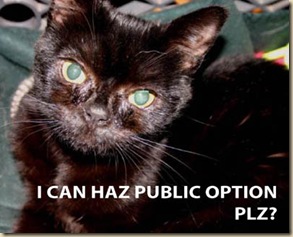23 October 2009
I used to be politically active. Then I went to sleep for a few years. And then I woke up again. What the hell happened to me?
It started in my teens, with a passion about Watergate and bringing the Nixon White House to its knees. I grew up in a staunchly Democratic family, but one which valued an intelligent opposition. With Nixon, we had only a compromised opposition, and I, along with my family and many of my friends were righteously outraged. Political awareness became a constant in my life.
In my twenties, my political leanings moved farther left, and my activism grew. I worked for the end of the US-sponsored wars in Central America, I marched for women’s rights and gay rights, worked on little ‘zines for lefty causes, helped keep my local women’s shelter open, read voraciously on the causes of my times, and spent endless hours hashing it all out with my friends and family.
When I was about 30, I moved, along with my nine year old daughter and my girlfriend of five years, to a county and state that was deeply immersed in an intense battle over gay rights. My daughter was entering public school for the first time (she’d been in parent-run schools up to that point), and I went back into the closet a bit. I retreated from most of my political activity as well. That retreat was in part due to worries about my daughter being targeted as coming from a gay family, and in part also to a very different schedule (new job, no extended family to share child-raising with). And it was due also to a kind of weariness that comes over you at times.
And there’s no doubt that 12 years of Reagan-Bush was wearing me out.
By the time Bill Clinton came into office, I was working for a non-profit women’s health clinic, immersed in the struggle to help women obtain decent, respectful reproductive health care. My clinic offered abortions among its many services, so I was also immersed in the abortion wars. My activism was practical – helping women find information and services for all kinds of health care, publicizing the attacks on the clinics, fundraising and the like. (An aside here: it really made a difference when Bush Sr. exited the scene, and Clinton stepped into the White House – the gag rule was lifted, and we could give our clients better information and services. In just that microcosm, you can’t tell me it makes no difference which party holds the White House.)
And then we got Bush Jr., the Boy King. I groaned, but tried to buck up. He was awful, inane, snotty. He was an embarrassment. I hadn’t liked his dad much, but at least Sr. wasn’t so embarrassing on the world stage (okay, I admit the vomiting-on-a-foreign-dignitary episode was pretty effing bad…) If I’d realized the power which Cheney and Rumsfeld were wielding, I’d have been more depressed, but as it was, I was keeping my chin up. And then 9-11 happened. And then Bush’s awful response, and the incredible war-mongering began, and the reactionary anger against anything Muslim. And then the Patriot Act. And then Afghanistan. And then Iraq. And then the awfulness of our dead and our maimed coming home, and the utter despair of knowing that even greater numbers of people were dead and maimed in the countries where we’d been making war.
It just kept getting worse. And I kind of went into hibernation, politically.
I was hiding, but at the same time, it wasn’t that I wasn’t aware, or wasn’t angry, or far too frequently frightened about what was going on around me. Still, I could not muster the political energy to do much more than vote. Compared to my usual verbose self (this post proves my point) I could barely talk about what I thought. I wrote almost nothing. I made myself listen to the daily NPR reports with increasing grim determination. I scanned headlines, but couldn’t bear to venture into the articles. I let my newspaper subscriptions go. I didn’t protest Bush. I didn’t protest the war, at least outside of my circle of acquaintances. The world was in the hands of mad men, and everything felt futile.
I muttered, at times, to sympathetic friends on the source of my political frustrations. We muttered and cursed and stomped our feet together, and I don’t think I was alone in feeling otherwise immobilized. To come up against the paranoia of the Bush administration made me feel like any effort would make no dent in the brick wall I was banging my head against, and damage my head plenty.
But there was a dim light at the end of the tunnel.


